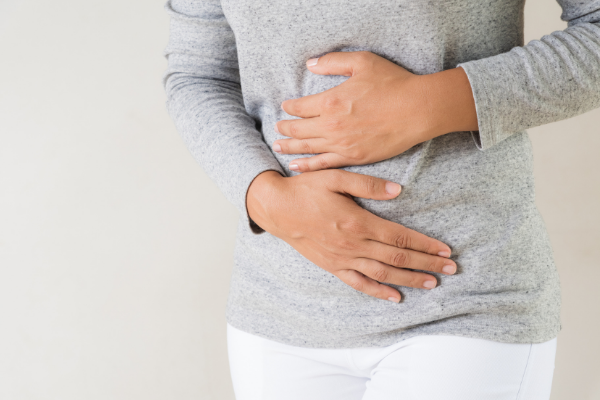Are you dealing with bloating? This may result in enlargement (a ballooning effect) of your abdomen as well as discomfort, gas, and sometimes pain. Regardless of whether or not the condition is acute or chronic, the first thing to ask is: “Why is it occurring?”. As you continue to read, you will find some of the most frequent reasons you may feel bloated and suggestions for reducing bloating overnight.
Constipation

While there are a variety of various reasons as to why you may be experiencing frequent bloating, constipation is the most prevalent explanation for this condition. When you eat, your stomach will fill up and somewhat distend as it absorbs the nutrients entering. As previously said, this is quite common and will ultimately subside when you go to sleep or have a bowel movement. However, if you are constipated and are not going to the toilet regularly like you should be doing, your stomach may look bloated until you can empty your bowels of their contents. If you find yourself constantly complaining about persistent constipation, you may be suffering from a medical condition. If this becomes a recurring issue, you may want to consult with your doctor to rule out any medical reasons for the problem.
Another Group of Potential Causes
Additionally, you may be feeling bloated if you have swallowed too much air, suffer from a gastrointestinal condition such as gastritis or IBS, drink carbonated drinks, or have had a substantial meal. People who drink a large amount of carbonated water and soft drinks may experience bloating. In contrast, those who consume specific foods known to promote inflammation in the stomach may experience bloating due to their diet. Some medical issues may raise your risk of bloating, such as the following:
- IBS
- Pelvic inflammatory disease
- Gastritis or diverticulitis
- Infections
- Crohn’s disease
- Inflammation
Recognizing and Treating the Source of Your Bloating
The most challenging aspect of this process is determining what is causing you to be bloated in the first place. First and foremost, there are a few things to consider. The first step is to consult with your doctor, who can frequently rule out medical reasons for your bloating and constipation. Following that, if you suspect that a food sensitivity causes your symptoms, finding out which foods and eliminating those items or doing an elimination diet can work wonders! Also, take a look at your lifestyle and the foods you consume. If you consume many inflammatory foods, suffer from constipation, or only drink carbonated drinks, it is probable that this is the source of your problem.
Tips for Getting Rid of Bloat
Are you fed up with feeling bloated and uncomfortable all of the time? Here are a few tips to help you decrease bloating overnight.
- Make sure that you are drinking enough plain water to help alleviate bloating. Check to be sure the water is free of carbonation and simple in flavor.
- Avoid Sugar alcohols. These sweeteners, including xylitol, mannitol, and sorbitol (to mention a few), are found in everything from gum to energy bars. Overeat them, and you’ll experience gas, cramps, bloating, and even diarrhea as your digestive system adjusts to the new environment!
Keep an eye on your fiber intake.
Keeping an eye on your fiber intake helps to keep your digestive system running smoothly. It also enables you to feel fuller for longer periods of time, which is beneficial if you’re trying to lose weight in the first place! The problem arises when you move from consuming very little fiber to consuming an excessive amount, such as deciding to change your eating habits to become healthier. If eating a lot of fiber is not something you do, it may make you feel bloated and uncomfortable. Too much fiber may be difficult to digest and can result in gas production, both of which can cause you to get bloated. To assist your body digest fibrous foods more readily, I suggest aiming for between 20 and 25 grams of fiber per day and drinking plenty of water along with any fibrous foods you consume. It is also important to engage in regular physical activity. Walking is one of the best activities for relieving bloating, but many different yoga positions may benefit this situation as well.
Keep the carbs to a minimum.
Despite having a bad reputation, carbohydrates are not the enemy. Because they are your body’s primary fuel source, you need them at all times. Nevertheless, to produce glycogen, which is a type of energy stored in your muscles and liver, carbohydrate molecules must attach to the water molecules as if it were their duty to do it. The more carbohydrates you consume, the more water your body retains, and the more bloated you get. This is still an unsatisfactory excuse to exclude carbohydrates from your diet entirely. However, if you want to de-bloat, you may reduce your carbohydrate intake for a day or two and focus your diet on greens and lean meats as the primary ingredients. Tea made from peppermint leaves is also beneficial for bloating and the digestive system as a whole. Try drinking 1-2 cups of peppermint tea every day for a week to note any differences you may spot.
Stay away from salty foods.
If your bra has lost its ability to regulate temperature and is feeling as tight as a corset, avoiding meals high in sodium may be the solution to that problem. When you consume salt, your body retains water in an attempt to maintain the correct balance of sodium and potassium in your circulation. I suggest limiting salt intake to less than 2,500 milligrams per day if at all feasible. Do not forget that drinking enough water throughout the day is essential for avoiding a lot of bloating. Consider treating any underlying medical problems that you believe are causing your discomfort. Of course, if you suspect that you’re bloated due to a disease like IBS, you must first treat the underlying medical condition that you believe is the source of your discomfort. It is important to remember that bloating is a very natural occurrence. If you are experiencing bloating and discomfort, it is beneficial to look at what you consume daily and then move forward with a treatment such as an elimination diet.
Ready to Get Rid of Your Hypothyroid Symptoms?
Check out these resources that can help you.
 While there are a variety of various reasons as to why you may be experiencing frequent bloating, constipation is the most prevalent explanation for this condition. When you eat, your stomach will fill up and somewhat distend as it absorbs the nutrients entering. As previously said, this is quite common and will ultimately subside when you go to sleep or have a bowel movement. However, if you are constipated and are not going to the toilet regularly like you should be doing, your stomach may look bloated until you can empty your bowels of their contents. If you find yourself constantly complaining about persistent constipation, you may be suffering from a medical condition. If this becomes a recurring issue, you may want to consult with your doctor to rule out any medical reasons for the problem.
While there are a variety of various reasons as to why you may be experiencing frequent bloating, constipation is the most prevalent explanation for this condition. When you eat, your stomach will fill up and somewhat distend as it absorbs the nutrients entering. As previously said, this is quite common and will ultimately subside when you go to sleep or have a bowel movement. However, if you are constipated and are not going to the toilet regularly like you should be doing, your stomach may look bloated until you can empty your bowels of their contents. If you find yourself constantly complaining about persistent constipation, you may be suffering from a medical condition. If this becomes a recurring issue, you may want to consult with your doctor to rule out any medical reasons for the problem.
